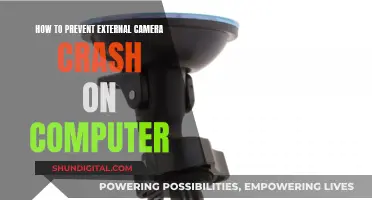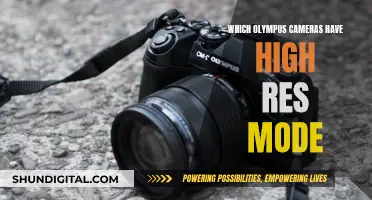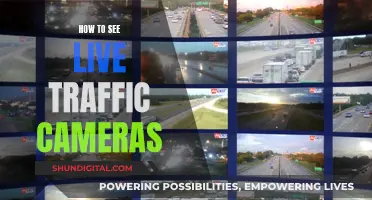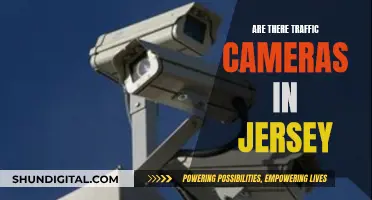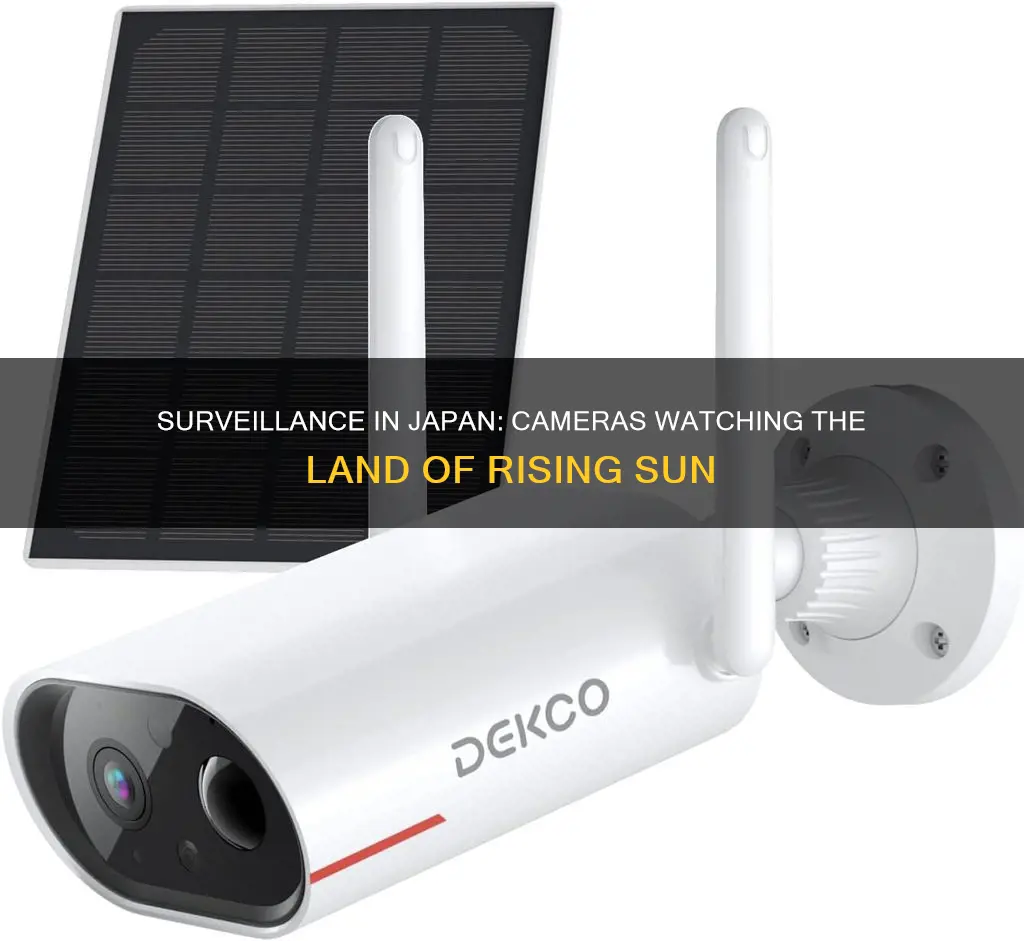
The presence of surveillance cameras in public spaces is a highly debated topic, with some arguing that they are necessary for public safety, while others express concerns about potential privacy invasions. In Japan, the use of surveillance cameras has sparked similar discussions, with a focus on balancing security and privacy rights. Japan has seen an increase in the number of security cameras in recent years, with cameras installed in public spaces such as train stations, city streets, and tourist attractions. These cameras are often equipped with advanced technologies, raising questions about the appropriate use of the captured data and the potential infringement on individuals' privacy.
| Characteristics | Values |
|---|---|
| Surveillance cameras in public spaces | Found in train stations, city streets, convenience stores, home gardens, tourist attractions, shopping districts, etc. |
| Surveillance camera usage | Crime prevention, disaster prevention, behaviour analysis, tourism, monitoring pets, etc. |
| Surveillance camera technology | High-resolution cameras with facial recognition, movement detection, and temperature detection capabilities |
| Surveillance camera companies | Panasonic, Trinity Inc., Digital Cube Technology, NTT Communications Corp., Kintetsu Railway Co. |
| Public opinion on surveillance cameras | 73% of Japanese people believe the government should have the right to use video surveillance in public areas |
What You'll Learn

Surveillance cameras in Japan are tolerated for safety
Surveillance cameras in Japan are commonplace and tolerated for safety reasons. They can be found in public places such as train stations, city streets, convenience stores, and even in home gardens. The Japanese public tends to be more tolerant of video surveillance in public areas compared to email monitoring, with 73% agreeing that the government should have the right to use video surveillance in public spaces. This relatively high tolerance for video surveillance stems from the sense of security it provides.
The number of security cameras in Japan has increased significantly in recent years due to local government subsidies and other factors. This increase in surveillance cameras is aimed at improving public safety and has been indispensable in police investigations. For example, in 2019, ten surveillance cameras were installed on streetlights along Tokyo's Omotesando-dori, a high-end shopping boulevard, due to an increase in pickpocketing and camera voyeurism. The busy shopping district, often bustling with Japanese youth, brand-name shoppers, and foreign tourists, saw a rise in crimes that spurred an association of Omotesando retailers to urge the Tokyo Metropolitan Police Department to install security cameras.
While the advanced capabilities of security cameras are beneficial for crime prevention and disaster prevention, there are valid concerns about the potential infringement on individual privacy. Modern security cameras can capture and record in high resolution, sometimes capturing more information than necessary. For instance, a security camera installed near the entrance of a convenience store for security purposes may inadvertently capture not only people entering and exiting the store but also those walking nearby.
To address privacy concerns, Japan has established guidelines and regulations regarding the installation and use of security cameras. The Personal Information Protection Commission has provided guidelines on handling personal information related to security camera footage, emphasizing the need to specify the purpose of using such information. Additionally, municipalities have established specific installation standards and guidelines for security cameras, including the basic principle that the installation and operation of security cameras should be limited to what is necessary to achieve their intended purpose.
In conclusion, surveillance cameras in Japan are tolerated for safety reasons, and their presence is generally accepted by the public. However, it is crucial to balance safety concerns with the protection of individual privacy, and Japan has implemented measures to ensure the appropriate use of security cameras while respecting people's privacy rights.
Maximizing Camera Focus: Capturing Sharp Images
You may want to see also

They are used in public spaces and private residences
Surveillance cameras are prevalent in Japan, and their usage is diverse, spanning both public spaces and private residences. In public areas, they are often installed on streetlights, train stations, city streets, convenience stores, and tourist attractions. The Tokyo Metropolitan Police Department, for instance, installed surveillance cameras on streetlights along Omotesando-dori, a high-end shopping boulevard in Shibuya Ward, to address the growing concerns of pickpocketing and camera voyeurism in the area.
The use of surveillance cameras in public spaces is generally well-tolerated in Japan, as they provide a sense of security. This tolerance is reflected in survey results, where 73% of Japanese respondents supported the government's right to employ video surveillance in public areas. The increasing acceptance of surveillance cameras has led to a surge in their numbers, aided by local government subsidies and other initiatives.
Surveillance cameras are also finding their way into private residences and businesses. Home security systems allow individuals to monitor their homes remotely, keeping an eye on children, pets, and the elderly. These systems are becoming more accessible due to dropping prices and advancements in technology, such as higher resolutions and artificial intelligence capabilities. However, the increased usage of surveillance cameras in private spaces raises privacy concerns, and there have been legal cases involving disputes over the installation of cameras and the handling of recorded footage.
To balance security and privacy, Japan has established guidelines and regulations for the installation and use of surveillance cameras. These guidelines emphasize the need to limit the scope of surveillance to its intended purpose, obtain consent from individuals or landowners, protect personal information, and prevent the unauthorized disclosure of recorded footage.
The Making of Fuji Medium Format Cameras
You may want to see also

They are useful for crime prevention and disaster prevention
Japan has seen a surge in the number of security cameras in recent years, with local government subsidies and other initiatives. Security cameras are installed in public places such as train stations, city streets, convenience stores, and even private spaces like home gardens. These cameras are used for crime prevention and disaster management.
Crime Prevention
Security cameras have proven to be effective in identifying criminals and preventing crimes such as shoplifting. For instance, a court case involving a convenience store owner who installed security cameras to prevent shoplifting was deemed appropriate and necessary and not a violation of privacy. Additionally, the advanced capabilities of modern security cameras, such as high-resolution capture and recording, aid in clearly identifying individuals, which can be beneficial during police investigations.
Disaster Prevention
Security cameras can also play a crucial role in disaster prevention and management. For example, they can be installed in remote areas like rivers and embankments to monitor flood-prone areas or areas susceptible to landslides. By providing real-time information, these cameras can help authorities make timely decisions and take appropriate action to mitigate potential disasters.
Positive Social Impact
The presence of security cameras has a positive impact on trust in others. A study by Daisuke Takagi found that security camera awareness was positively associated with trust in others. This suggests that the installation of security cameras can foster a sense of security and trust within communities.
However, it is important to consider the potential negative consequences of security cameras, such as their impact on neighborhood cohesion and privacy infringement. To mitigate these negative effects, guidelines and standards for the installation and use of security cameras have been established by municipalities and the Personal Information Protection Commission in Japan. These guidelines emphasize the importance of obtaining consent, minimizing the recording of specific individuals, protecting privacy, and using camera images only for their intended security purposes.
The Best Ways to Store Camera Batteries
You may want to see also

Surveillance cameras can violate privacy laws
Japan has seen a surge in the number of security cameras in recent years, with local government subsidies and other factors contributing to this increase. This has raised questions about whether surveillance cameras can violate privacy laws.
Surveillance cameras can indeed infringe on privacy rights, and this issue has been the subject of court cases in Japan. For example, a plaintiff sued a convenience store owner for damages, arguing that their privacy rights were violated when the store submitted security camera footage to the police without their consent. The court acknowledged that individuals should be allowed to not want others to know about their product selection and behaviour in a store, and that filming without consent in such a setting infringes on privacy rights.
The Japanese Personal Information Protection Law defines "personal information" as any data that can identify a specific individual. This includes security camera footage that captures identifiable individuals. The law requires proper handling and management of such information to protect privacy. Guidelines from the Personal Information Protection Commission recommend specifying the purpose of using personal information and using camera images and facial recognition data only for that specified purpose.
To avoid violating privacy laws, it is recommended to adhere to guidelines, such as displaying signs indicating the presence of security cameras and preventing the leakage of recorded footage. It is also important to respect people's "reasonable expectation of privacy" in certain areas, such as bathrooms, changing rooms, private bedrooms, etc.
In summary, while surveillance cameras can be a valuable tool for crime prevention and public security, their use must be balanced with the protection of individual privacy rights, especially in settings where people have a reasonable expectation of privacy.
Understanding Tapo Camera's Home and Away Modes
You may want to see also

They are also used for tourism and behaviour analysis
Japan has seen a rapid and widespread introduction of electronic surveillance technologies, with the number of security cameras soaring in recent years due to local government subsidies and other factors. In 2019, ten surveillance cameras were installed on Omotesando-dori, a high-end shopping boulevard in Tokyo, due to an increase in crimes such as pickpocketing and voyeuristic photos and videos.
The use of surveillance cameras in Japan is not limited to crime prevention and safety, however. They are also used for tourism and behaviour analysis. For example, in 2002, the Japanese government installed 190 surveillance cameras in 10 cities across the country in preparation for the FIFA World Cup, citing concerns about potential football hooliganism. The cameras remained in place after the event, with some cities, such as Tokyo, extending their use to combat terrorism, crime, drugs, and people-trafficking.
The installation of surveillance cameras in public spaces has had a positive effect on trust in others, according to a study by Daisuke Takagi. However, the study also found a negative relationship between security camera awareness and perceived neighbourhood cohesion. This suggests that while surveillance cameras can increase feelings of security and trust, they may also have a detrimental effect on social cohesion within communities.
The rise of surveillance technologies in Japan presents a complex situation with potential benefits and drawbacks. While some people may feel safer due to the presence of surveillance cameras, particularly in high-risk areas or during major events, there are also concerns about privacy and the potential negative impact on community relationships.
Editing Essentials: Camera Raw CS3 Techniques
You may want to see also
Frequently asked questions
Yes, surveillance cameras are used in Japan, particularly in public places such as train stations, city streets, and tourist spots.
Surveillance cameras are installed in Japan primarily for crime prevention, disaster prevention, and public security. They are also used for behaviour analysis, tourism, and monitoring pets at home.
Yes, security cameras are gaining popularity in Japanese homes. People use them to monitor their pets, children, and elderly family members remotely.
One of the main concerns is the potential infringement on privacy. As the cameras can capture and record detailed information, there is a risk of invading individual privacy if the data is not handled and managed properly.
According to a survey, 73% of respondents in Japan believed that the government should have the right to use video surveillance in public areas. This tolerance may be due to the sense of security that the cameras provide. However, when it comes to email monitoring, only about 30% supported government monitoring.


